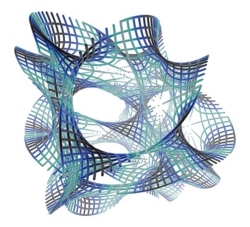Thimble Full of Cosmology
- Friday, June 14 2013 @ 08:55 am UTC
- Contributed by: masodo
- Views: 3,941

 What I don't know about Cosmology could fill an entire Universe(s) - all but perhaps a timble full.
What I don't know about Cosmology could fill an entire Universe(s) - all but perhaps a timble full.
If you are just starting out, then you might even want to know the meaning of the word. According to The Free Dictionary - [By Farflex]...
cos·mol·o·gy (k z-m
z-m l
l
 -j
-j )
)
meh?... it'll do.
For me Cosmology is, on the one hand, a study generally relegated to Mathematicians, Theoretical Physicists, Astrophysicists and such; on the other hand, enough mystery exists to elicit work by Artist, Philosophers, Theologians and abstract thinkers in general.
 Thanks in no small part to the patient works of Carl Sagan (Cosmos) and Brian Greene (Fabric of the Cosmos) I have been lured out onto the ledge of Cosmological understanding and have learned enough to know I should likely climb back inside my comfort zone, but the view from here is awesome.
Thanks in no small part to the patient works of Carl Sagan (Cosmos) and Brian Greene (Fabric of the Cosmos) I have been lured out onto the ledge of Cosmological understanding and have learned enough to know I should likely climb back inside my comfort zone, but the view from here is awesome.
It makes my head hurt to even attempt to grasp the theories and concepts with which today's scientists grapple. Ah, but no pain no gain. Why bother? Well, when a person with the intellect of Einstein goes to his grave longing for a "Grand Unification Theory" I say, it must be important. We should probably see what we can do about that. By we of course I mean humanity.
Just when I start to almost (maybe, at some level) get a handle on String Theory and Super String M Theory, I get hit splat upside the head with Brane World theory. [See the The Official String Theory Web Site.] It is not the purpose of this article to educate anyone on these concepts. I only hope to convey that I do have a genuine interest in these subjects and would encourage anyone to exercise their mind by investigating the science of reality. There is no shortage of information available for anyone looking to understand such complex research.
I was not actively seeking enlightenment when I happened upon The Trenches of Discovery website. I was impressed with the site enough to shine the BlogDogIt Spotlight on their efforts. You see, the thing about the BlogDogIt Spotlight is, these are blogs that I am genuinely taken with and am actively following. When I am so moved I will comment and participate with these folks in a constructive manner in an effort to show my support for their labors. That for me is the essence and appeal of blogging.
Shaun Hotchkiss of The Trenches of Discovery was providing on-the-scene coverage of "The universe as seen by Planck" (conference) in Helsinki, Finland. It was in the course of this coverage that I offered up a very disjointed question regarding the implications to Brane Theory and its associated "Big Splat Theory" by way of the much improved CMB (Cosmic Microwave Background) data provided by the Planck Satellite Mission. I asked the question simply because I favor "Big Splat." The reason I support the theory is that as complex as the concept is, I comprehend it even better than "Inflation Theory"; it just feels right to me. (I realize this is on a par with saying I root for the Green Bay Packers because I like their uniforms - it is what it is.) I genuinely wanted to know if the experts had found any supporting evidence for my pet extra-dimensional thought exercise.
Not only was my question taken seriously but the evidence seems to indicate that Shaun took "virtual me" along with him to the conference. I was honored that he not only took the time to answer the question I put forth but introduced me to a couple of folks of like mind to myself (albeit of greater intellect.) I have my resarch cut out for me now. [I appreciate that Shaun.] Please read the following excerpt and be sure to frequent The Trenches of Discovery - they really are on the front-lines of discovery!
Excerpted from: Cosmological perturbations post-Planck - wrap up - By Shaun Hotchkiss
"The big splat"
A commenter (masodo) asked me a question during the conference about something called "the big splat". Now I have to admit that I'd never heard of "the big splat" before he or she asked this question, but google tells me that it is another name for the "ekpyrotic/cyclic" universe, which I definitely have heard of (I think the "big splat" name is before my time).
Masodo wished to know what the implications were from Planck for the big splat and whether it was discussed at the conference.
Firstly, the ekpyrotic universe is a replacement for inflation, but not the big bang. In the ekpyrotic scenario the fluctuations in the universe's density, etc are created during a contraction phase, but then the ordinary big bang still happens after that. Nobody in cosmology doesn't believe in the big bang any more (sorry for the double negative). Nobody. Even the people who used to work on steady-state models now work on oscillating models that are "steady-state" (i.e. periodic) in the long, long, long term. The temperature and polarisation of the CMB has within it evidence of sound waves that were rippling through the universe 14 billion years ago when the universe was ~1000 times hotter than it is now and they look exactly like the big bang predicted they would decades ago. We will definitely gain new understanding into how the big bang happened, what started it, what came before it, etc, etc, but it did happen!
Regarding the "big splat" it wasn't discussed during the conference in a scientific context. Not too many people work on it. If one of those people had been at the conference I'm sure it would have been discussed, but none were. It was discussed a little bit at the coffee breaks but only because Hiranya Peiris (one of the conference guests) was having a public debate with Paul Steinhardt (one of the creators of the ekpyrotic model) over skype and she was canvassing people's thoughts.
The people who work on the ekpyrotic universe (e.g. Steinhardt) have claimed that Planck shows evidence that favours this scenario over inflation. This is not the consensus.
Moreover, both paradigms have issues. Inflation has a problem with initial conditions; that is, the universe has to be in a specific state in order for inflation to begin. It's hard to quantify what a "generic initial universe" should look like so most cosmologists don't worry about this problem. Once that problem is ignored there do exist complete models of inflation that can take us from an inflating universe all the way to today. The ekpyrotic universe is less well developed, but its major problem is that it requires the universe to go from a contracting phase to an expanding phase. I haven't studied the model in detail and the creators of the model have speculative ways for how this could happen, but it does make the paradigm less compelling. Note that there is a qualitative difference in that, once inflation has started, it does work, but this change from contracting to expanding has to happen after the fluctuations in the universe have been generated, so it is a more pertinent problem for the ekpyrotic universe than the initial condition problem is for inflation.
Given this, until evidence does arrive that favours the ekpyrotic universe over inflation the "most probable" paradigm is inflation (at least according to my priors). However, until evidence arrives that overwhelmingly favours inflation, research into alternative paradigms is definitely still worthwhile. No matter how compelling we find it, inflation might just turn out not to be true.
Thanks masodo for the great question!
Fire away if you have any more!!
~
Thimble image by Llangefni[tag:musing science blogs educational]































 Them All!
Them All!













